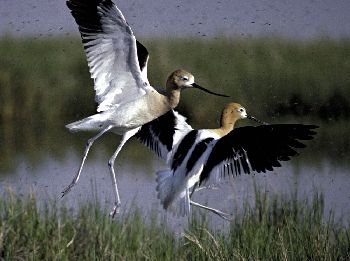
Publisher:
Bonnie King
CONTACT:
Newsroom@Salem-news.com
Advertising:
Adsales@Salem-news.com

~Truth~
~Justice~
~Peace~
TJP
Sep-22-2009 11:57

 TweetFollow @OregonNews
TweetFollow @OregonNews
House Hears Testimony on Need for Legislation to Conserve Rapidly Disappearing Migratory Birds
Salem-News.comThe Senate Environment and Public Works Committee has already passed H.R. 2213’s Senate counterpart.
 The American_Avocet Courtesy: U.S. Fish & Wildlife and Wikipedia |
(WASHINGTON D.C.) - Legislation that reauthorizes the existing Neotropical Migratory Bird Conservation Act (NMBCA) at significantly higher levels is the subject of a House hearing today. Sponsored by Reps. Ron Kind (D-WI) and Jim Gerlach (R-PA), H.R. 2213, is required to meet the growing needs of migratory bird species.
“This legislation is urgently needed because hundreds of songbird species are now in decline or facing serious threats; effective conservation projects supported by the NMBCA can help us to start turning that around,” said Darin Schroeder, ABC’s Vice President of Conservation Advocacy, who is testifying in support of the legislation at today’s hearing.
“NMBCA has a proven track record of bringing partners together and leveraging additional support; for each dollar the government spends, over four dollars have been contributed to the bird conservation projects by the partner groups.”
Schroeder’s testimony is available at abcbirds.org/newsandreports/fishers_wildlife_oceans_testimony.pdf.
Nearly half of all migratory bird species in the U.S. are currently in decline or are being negatively impacted by serious threats including habitat loss, collisions with towers and buildings, predation by cats, and pesticide poisoning.
The Senate Environment and Public Works Committee has already passed H.R. 2213’s Senate counterpart, S. 690, sponsored by Senator Ben Cardin (D-MD) and Michael Crapo (R-ID). The bill is now awaiting debate in the full Senate.
Saving Migratory Birds for Future Generations: The Success of the Neotropical Migratory Bird Conservation Act, a report by American Bird Conservancy, details the disturbing downward trend in the populations of many migratory species and its causes, and documents the effectiveness of NMBCA.
NMBCA supports partnership programs to conserve birds in the United States, Canada, Latin America, and the Caribbean, where approximately five billion birds of over 500 species, including some of the most endangered birds in North America, spend their winters.
Projects include activities that benefit bird populations such as habitat restoration, research and monitoring, law enforcement, and outreach and education. Between 2002 and 2007, the program supported 225 projects, coordinated by partners in 44 U.S. states/territories and 34 countries. Projects involving land conservation have affected about 3 million acres of bird habitat.
Staff of the U.S. Fish & Wildlife Service report receiving many more requests for high quality conservation projects than they can provide grants for. NMBCA currently provides a maximum authorization of $6.5 million for fiscal year 2010. Under the new law, that amount would increase to $20 million by 2015. Grants require matching funds from other non-federal sources. Thus far, more than $30 million from NMBCA grants has leveraged over $135 million in partner contributions.
FWS lists 341 migratory bird species that can benefit from the program: fws.gov/birdhabitat/Grants/NMBCA/BirdList.shtm.
Source: American Bird Conservancy
Articles for September 21, 2009 | Articles for September 22, 2009 | Articles for September 23, 2009
Quick Links
DINING
Willamette UniversityGoudy Commons Cafe
Dine on the Queen
Willamette Queen Sternwheeler
MUST SEE SALEM
Oregon Capitol ToursCapitol History Gateway
Willamette River Ride
Willamette Queen Sternwheeler
Historic Home Tours:
Deepwood Museum
The Bush House
Gaiety Hollow Garden
AUCTIONS - APPRAISALS
Auction Masters & AppraisalsCONSTRUCTION SERVICES
Roofing and ContractingSheridan, Ore.
ONLINE SHOPPING
Special Occasion DressesAdvertise with Salem-News
Contact:AdSales@Salem-News.com

googlec507860f6901db00.html



Terms of Service | Privacy Policy
All comments and messages are approved by people and self promotional links or unacceptable comments are denied.
[Return to Top]
©2025 Salem-News.com. All opinions expressed in this article are those of the author and do not necessarily reflect those of Salem-News.com.